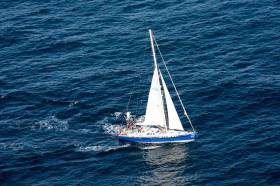Displaying items by tag: ObSERVE Programme
Government Extends Funding to Protect Ireland’s Vital Marine Ecosystem With New Aerial Survey
An Irish-led international consortium will this month begin extensive aerial surveys of almost half a million square kilometres of Ireland’s maritime area.
The ObSERVE Aerial 2 survey aims to help build a greater understanding of Ireland’s marine wildlife and the habitats they need to survive and to thrive.
Extensive aerial surveys under the ObSERVE Programme are due to start this month, sampling a large portion of Ireland’s maritime area of almost 490,000 sq km in a project led by University College Cork.
Our natural marine environment and its renewable energy resources can also help the State meet its climate goals, and the Government says it is committed to understanding and protecting our marine life when developing plans for the offshore.
Speaking at the launch of the ObSERVE Aerial 2 project, Minister for the Environment, Climate and Communications, Eamon Ryan said: “Developing our offshore wind resources gives Ireland a wonderful opportunity to break away from fossil fuels and meet our ambitious climate targets. In doing so we are determined to protect our marine environment and the wonderful biodiversity it contains.
“The scientific knowledge from the ObSERVE project will play a critical role in developing our resources in a sustainable way. The collaboration of my department, the Department of Housing, Local Government and Heritage and the Sustainable Energy Authority of Ireland in supporting the project emphasises the importance the State places on protecting our marine environment and our shared ambitions in combating climate change and biodiversity loss.”
Minister of State for Heritage, Malcolm Noonan added: “The conservation of marine biodiversity is one of my key priorities as Minister for Heritage and this important research programme will support that endeavour.
“Ireland’s maritime area is one of the largest in Europe — we have a responsibility to look after it and the diverse array of wildlife that depends on it, especially as we develop our offshore renewable energy resource as part of Ireland’s ambitious climate action agenda.
“The Observe 2 project represents an important step forward as we continue to develop our scientific understanding of the marine ecosystem and work collaboratively with all stakeholders to ensure its long-term protection.”
Data collected as part of the first phase of the programme in recent years has already filled major information gaps and has assisted in more informed and sustainable management of offshore activities, and in the development of suitable conservation strategies that will sustain our marine environment into the future.
The UCC team responsible for he project is led by Dr Mark Jessopp and Prof Emer Rogan from the School of Biological, Earth and Environmental Sciences, with partners from Action Air, France, Wageningen University & Research in the Netherlands and Duke University in the US.
“The survey programme includes summer and winter flights over the next two years, but we are looking forward to the challenge,” Dr Jessopp said.
Professor Rogan added: “The results from the ObSERVE II programme will provide us with a unique timeseries to look at trends in seabird and cetacean abundance and distribution, informing management and conservation.”
The ObSERVE Programme is jointly funded by the Department of the Environment, Climate and Communications, Department of Housing, Local Government and Heritage and Sustainable Energy Authority Ireland (SEAI).
Arctic Beluga Among Whale Species Recorded In Irish Waters In New Research
The Beluga whale — a species mainly found in the Arctic Circle — has been recorded in Irish territorial waters as part of a groundbreaking three-year research project into our offshore habitats for marine wildlife.
On Friday (23 November) the ObSERVE Programme team announced the findings of its aerial and acoustic projects, led respectively by UCC and GMIT and which survived larked areas of the Irish and Celtic seas as well as the Atlantic Margin.
Besides the begula, the researchers detected endangered blue whales underwater up to 200km from their survey position, noting strong seasonal patterns in their sounds.
The most abundant baleen whale species is the minke whale, whose numbers in Irish waters reach some 12,000 in summer months and 5,000 in winter, including significant sightings of calves.
Fin whales were also recorded throughout the year, suggesting the continental slope and adjacent deep waters are an important area for this species.
Numbers of deep-water beaked whales — recently the subject of concern over mass strandings in Ireland and Scotland — were also estimated to reach some 4,000 in winter months.
In addition the ObSERVE Programme studied distribution and behaviour of dolphin species, as well as the half a million seabirds of the Atlantic Margin — which included sightings of white-tailed tropicbirds normally found much further south.
The news comes just days after a rare spotting of killer whales in pair off the coast of Co Dublin — and as hundreds of translucent parasitoid phronima have washed up on a beach near Dingle, as TheJournal.ie reports.




























































